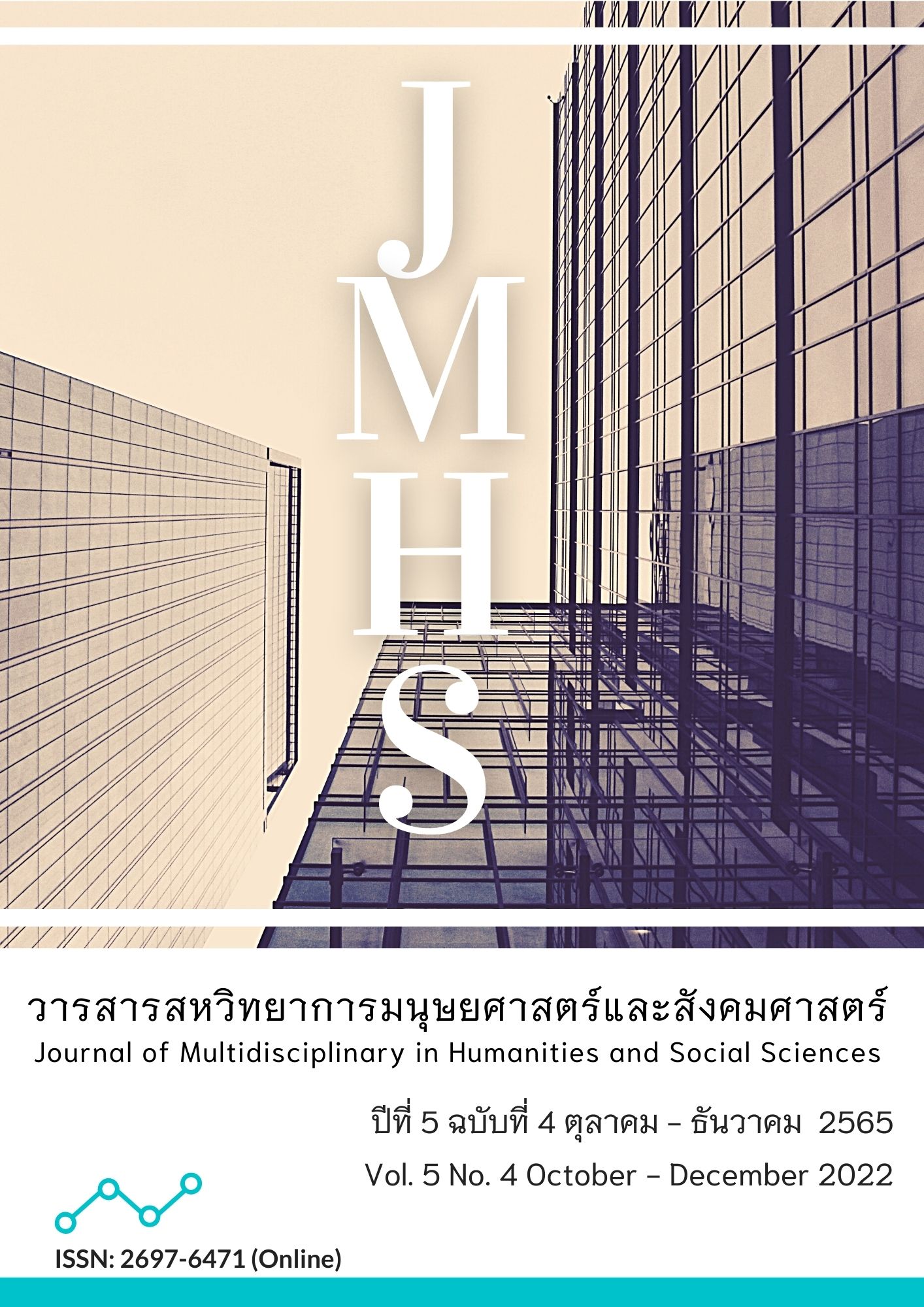ผลการพัฒนารูปแบบการจัดการเรียนรู้ภาษาอังกฤษเสริมสร้างการอ่าน การเขียนอย่างมีวิจารณญาณและการกำกับตนเองในการเรียนรู้ของนักเรียนชั้นมัธยมศึกษาปีที่ 3
Main Article Content
บทคัดย่อ
บทความวิจัยนี้มีวัตถุประสงค์ 1) เพื่อเปรียบเทียบความสามารถด้านการอ่านการเขียนภาษาอังกฤษอย่างมีวิจารณญาณและการกำกับตนเองในการเรียนรู้ของนักเรียนชั้นมัธยมศึกษาปีที่ 3 ก่อนและหลังการจัดการเรียนรู้ด้วยรูปแบบ PTK Model และ 2) เพื่อเปรียบเทียบความสามารถด้านการอ่านการเขียนภาษาอังกฤษอย่างมีวิจารณญาณและการกำกับตนเองในการเรียนรู้ของนักเรียนชั้นมัธยมศึกษาปีที่ 3 หลังเรียนของนักเรียนที่เรียนแบบปกติและนักเรียนที่เรียนด้วยรูปแบบ PTK Model รูปแบบการวิจัยเป็นการวิจัยเชิงทดลอง กลุ่มตัวอย่างเป็นนักเรียนชั้นมัธยมศึกษาปีที่ 3 ของโรงเรียนขยายโอกาสทางการศึกษา 2 โรงเรียน จำนวน 2 ห้องเรียน ได้มาโดยการสุ่มอย่างง่าย และจับสลากเลือกกลุ่มตัวอย่าง เครื่องมือที่ใช้ในการวิจัย ได้แก่ รูปแบบการจัดการเรียนรู้ แผนการจัดการเรียนรู้ แบบทดสอบวัดความสามารถด้านการอ่านภาษาอังกฤษอย่างมีวิจารณญาณ แบบทดสอบวัดความสามารถด้านการอ่านภาษาอังกฤษอย่างมีวิจารณญาณ แบบทดสอบวัดการกำกับตนเองในการเรียน และแบบสอบถามวัดการกำกับตนเอง วิเคราะห์ข้อมูลโดยใช้ค่าเฉลี่ย ส่วนเบี่ยงเบนมาตรฐาน และการทดสอบค่าทีแบบกลุ่มอิสระและไม่เป็นอิสระต่อกัน ผลการวิจัยพบว่า
1. นักเรียนที่เรียนรู้ด้วยรูปแบบ PTK Model มีคะแนนความสามารถด้านการอ่านการเขียนภาษาอังกฤษอย่างมีวิจารณญาณและการกำกับตนเองในการเรียนรู้หลังเรียนสูงกว่าก่อนเรียนอย่างมีนัยสำคัญทางสถิติที่ระดับ .05
2. นักเรียนที่เรียนรู้ด้วยรูปแบบ PTK Model มีคะแนนความสามารถด้านการอ่านการเขียนภาษาอังกฤษอย่างมีวิจารณญาณ คะแนนแบบทดสอบการกำกับตนเองในการเรียนรู้ ด้านความรู้และด้านกระบวนการเรียนรู้ และคะแนนแบบสอบถามวัดการกำกับตนเองในการเรียนรู้ ด้านการรับรู้ความสามารถของตนเอง หลังเรียนสูงกว่านักเรียนที่เรียนแบบปกติ
Article Details

อนุญาตภายใต้เงื่อนไข Creative Commons Attribution-NonCommercial-NoDerivatives 4.0 International License.
ทัศนะและความคิดเห็นที่ปรากฏในวารสาร ถือเป็นความรับผิดชอบของผู้เขียนบทความนั้น และไม่ถือเป็นทัศนะและความรับผิดชอบของกองบรรณาธิการ
เอกสารอ้างอิง
วิจารณ์ พานิช. (2556). การสร้างการเรียนรู้สู่ศตวรรษที่ 21. กรุงเทพฯ: มูลนิธิสยามกัมมาจล.
Bannert, M., Hildebrand, M., & Mengelkamp, C. (2009). Effects of a metacognitive support device in learning environments. Computers in Human Behavior, 25(4), 829-835.
Burden, P.R., & Byrd, D.M. (2010). Methods for effective teaching: meeting the needs of all students. (5th ed.). Boston: Allyn & Bacon.
Christie, M., Carey, M., Robertson, A. & Grainger, P. (2015). Putting transformative learning theory into practice. Australian Journal of Adult Learning, 55(1), 9-30.
Duffy, T.M., & Cunningham, D.J. (1996). Constructivism: Implication for the Design and Delivery of Instruction. pp. 170-195. in D. H. Jonassen (ed.). Handbook of Research for Educational Communications and Technology. New York: Macmillan Library Reference USA.
Flavell, J.H. (1979). The Development of Metacommunication. Paper presented at the Twenty–First International Congress of Psychology, Paris.
Graves. M.F., Juel C., & Graves. M.F. (2004). Teaching Reading in the 21st Century. New York: Pearson Education Inc.
Hunt, A., & Beglar, D. (2005). A framework for developing EFL reading vocabulary. Reading in a Foreign Language, 17(1), 23–59.
Kruse, K. (2008). Introduction to Instructional Design and the ADDIE Model. Retrieved from https://portal.ct.gov/-/media/CTDN/TtT2015/ttt2015module5IntroInstDesignADDIEpdf.pdf
Lewis, M. (2008). Implementing the lexical approach: Putting theory into practice. Zrinski, D.D: Heinle, Cengage Learning.
Marzano, R.J. (2000). Designing a New Taxonomy of Educational Objectives. Thousand Oaks,CA: Corwin Press.
Mezirow, J.D. & Associates. (2000). Learning as transformation: Critical perspectives on a theory in progress. San Francisco: Jossey-Bass.
Organization for Economic Co-operation and Development (OECD). (2021). 21st-Century Readers: Developing Literacy Skills in a Digital World. PISA, OECD Publishing, Paris.
Richards, J.C., & Rodgers, T.S. (2014). Approaches and methods in language teaching. (3rd ed.). Cambridge University Press.
Rotherham, A., & Willingham, D. (2009). 21st century skills: The challenges ahead. Educational Leadership, 67(1). 16-21.
Sweller, J. (1988). Cognitive load during problem solving: Effects on learning. Cognitive Science, 12, 257-285.
Zimmerman, M. A. (2002). Empowerment theory: Psychological, organizational and community levels of analysis. In J. Rappaport & E. Seidman (Eds.), Handbook of community psychology (pp. 43–63). New York: Kluwer Academic/Plenum.


